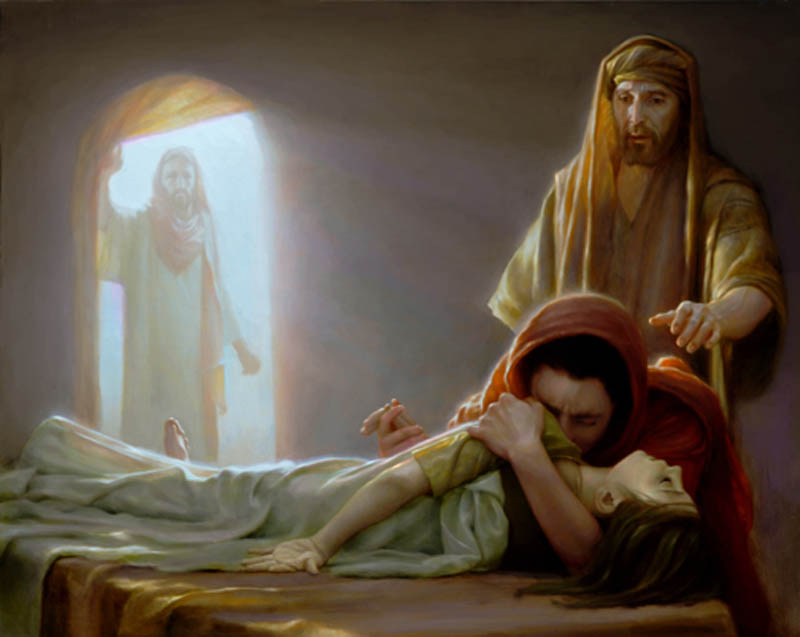
If you’re a parent, and your child is seriously ill, nothing else matters.
You would move heaven and earth to find the right doctor. You would pay any price for the right medicine. If you could, you would gladly take her place.
In the case of a synagogue leader named Jairus, it meant tracking down the controversial teacher from Galilee whom so many said could heal the sick. We don’t know anything about Jairus’ background or theological convictions or political inclinations. But his role as a synagogue leader suggests a serious degree of education and status. Maybe Jairus considered himself a cut above the itinerant Jesus.
Until his daughter got sick.
One of my friends wouldn’t give televangelists and healing ministries the time of day. Then he got cancer. He found himself channel surfing through religious TV stations late at night, listening for the first time to preachers he had recently identified as hucksters – just in case they had something to share that might connect him to God’s healing power. When people feel desperate, they quickly become open to desperate measures.
So it is with Jairus. His daughter is near death. She’s only 12 years old. Her whole life should be in front of her.
Propelled by urgency, he falls at Jesus’ feet. “He pleaded earnestly with him, ‘My little daughter is dying. Please come and put your hands on her so that she will be healed and live’” (Mark 5:23). Please come. Please.
Jesus comes. There is hope.
But then something goes wrong. Jesus stops to engage a woman who is also seeking healing. Her condition is serious. But it’s definitely not urgent.
As Tim Keller points out in his book King’s Cross, this is what we would call malpractice. If you’re an ER physician, you save the patient who is at death’s door, not the one who’s been suffering for years but can definitely hang in there for another 24 hours.
Suddenly Jairus’ worst fears come true. “While Jesus was still speaking [how can he still be speaking to this woman?], some people came from the house of Jairus. ‘Your daughter is dead,’ they said. ‘Why bother the teacher anymore?’” (Mark 5:35)
“Overhearing what they said, Jesus told him, ‘Don’t be afraid. Just believe.’” Jesus is the calm at the center of the storm. “Trust me, Jairus.”
Upon arriving at the house, they experience pandemonium – the weeping that flows from fresh grief. Jesus says, “Why all this common and wailing? The child is not dead but asleep.”
This has to register as the most insensitive comment imaginable. Those gathered are perfectly capable of distinguishing between slumber and death. And Jesus hasn’t even been present. How can he claim to know this girl’s condition? They dismiss him with derisive laughter.
Mark tells us what happens next: “After he put them all out, he took the child’s father and mother and the disciples who were with him, and went in where the child was. He took her by the hand and said to her, ‘Talitha koum’ (which means, ‘Little girl, I say to you, get up’). Immediately the girl stood up and began to walk around (she was 12 years old). At this they were completely astonished” (Mark 5:40-42).
Keller writes, “Of course they were astonished. Jairus came to Jesus for a fever cure, not for a resurrection. When you go to Jesus for help, you get from him far more than you had in mind.”
The vivid details recorded here suggest that we are hearing from eyewitnesses. Talitha koum is one of about a dozen Aramaic turns of phrase in the gospels. Bible scholars have long assumed that Aramaic (which has many similarities to Hebrew) was the everyday language of first century Jews.
Talitha was a term of endearment. It meant something like “sweetie” or “honey.” Koum wasn’t a theocratic command – “rise up” or “be resurrected.” It was an everyday expression, the kind of thing that a mom or dad might say to a child at first light of dawn.
“Honey, it’s time to get up.”
The gospels report only three occasions in which Jesus raises someone from the dead. Lazarus is the most famous. He also raises the son of a widow in the village of Nain. And then there’s the daughter of Jairus. Why does this young girl’s resurrection, which is reported in Matthew, Mark, and Luke, get so much attention?
Perhaps it’s because it displays the tenderness of Jesus. And the calm patience of Jesus (“Just trust me, Jairus”). And Jesus’ complete dominion over death. Keller imagines him saying, “If I have you by the hand, death itself is nothing but sleep.”
And maybe, just maybe, this story is a preview of what awaits us all in the next world.
Perhaps one day we, too, will feel the grip of a strong hand and hear the words, “Dear one, it’s time to wake up.”
